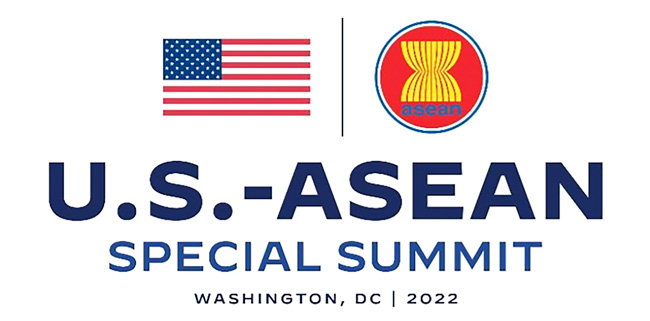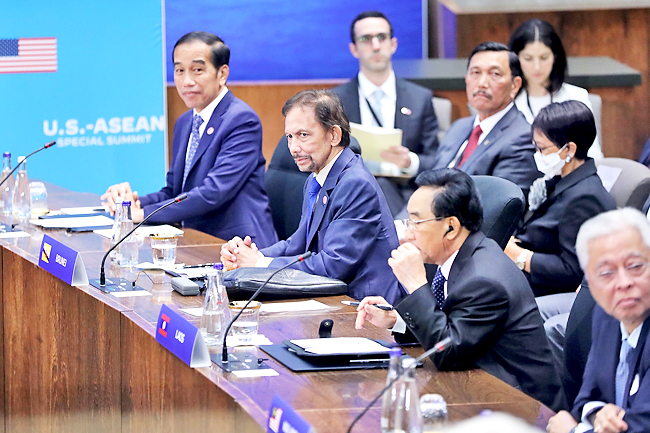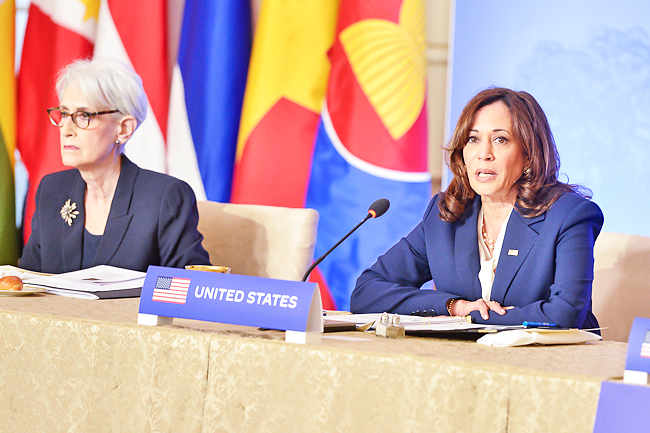His Majesty Sultan Haji Hassanal Bolkiah Mu’izzaddin Waddaulah ibni Al-Marhum Sultan Haji Omar ‘Ali Saifuddien Sa’adul Khairi Waddien, Sultan and Yang Di-Pertuan of Brunei Darussalam underlined that Brunei Darussalam continues to work closely with regional partners in promoting maritime security through dialogue and cooperation, through the hosting of the 9th Expanded ASEAN Maritime Forum last year, which focussed on international law and marine environmental protection; as well as the ASEAN Defence Ministers’ Meeting Plus, in which the ASEAN direct communications infrastructure between military officials was expanded to include external partners such as the United States (US).
Delivering a titah during a working luncheon hosted by US Vice President Kamala D Harris and the ASEAN-US Special Summit at the Department of State, Washington DC, His Majesty said maritime security cooperation in the region remains vital in ensuring the safety of sea lanes of communication.
Accompanying His Majesty was His Royal Highness Prince ‘Abdul Mateen.
Also in attendance were ASEAN heads of states and governments; the US Secretary of State; and the ASEAN Secretary-General.
Upon arriving at the Department of State, the monarch was greeted by Chief of Protocol of the US Ambassador Rufus Gifford.
His Majesty then proceeded to the Benjamin Franklin Room to attend the luncheon. His Majesty also highlighted that ASEAN has established the ASEAN SHIELD to ensure a collective, rapid and effective response to multi-dimensional emergencies and disasters in the future, and encouraged relevant US agencies, such as the Federal Management Agency and the US Centers for Disease Control and Prevention, to add value to ASEAN’s efforts to build a more resilient region.
His Majesty recalled the East Asia Summit Leaders’ Statement on Mental Health Cooperation, which the US co-sponsored in 2021, and hoped that ASEAN and the US can advance cooperation in mental health.
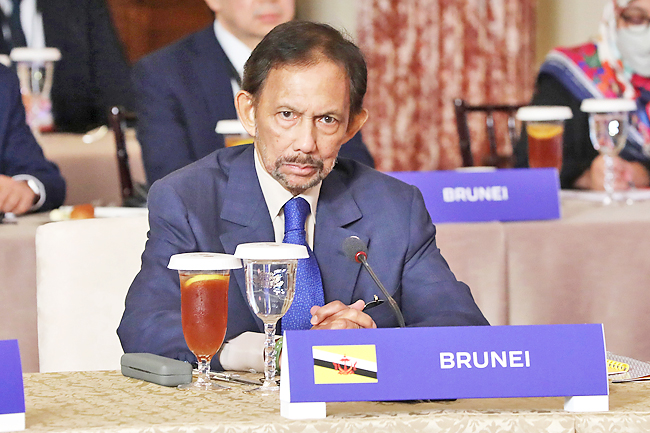
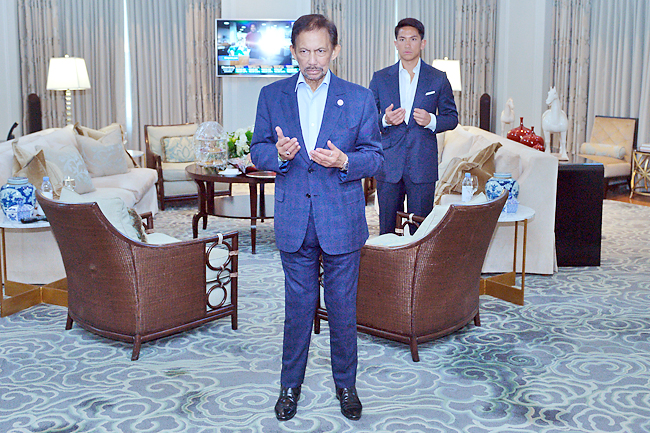
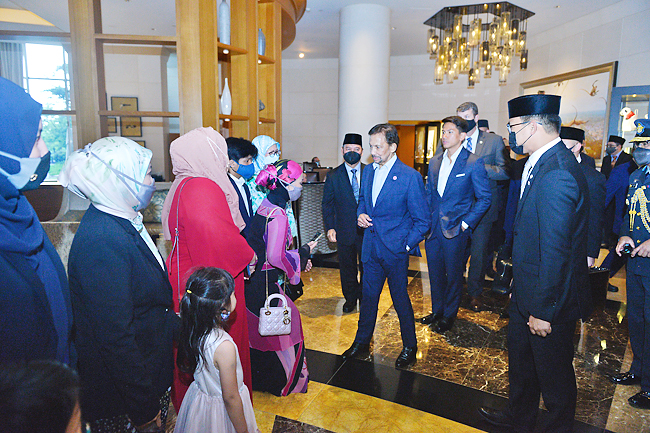
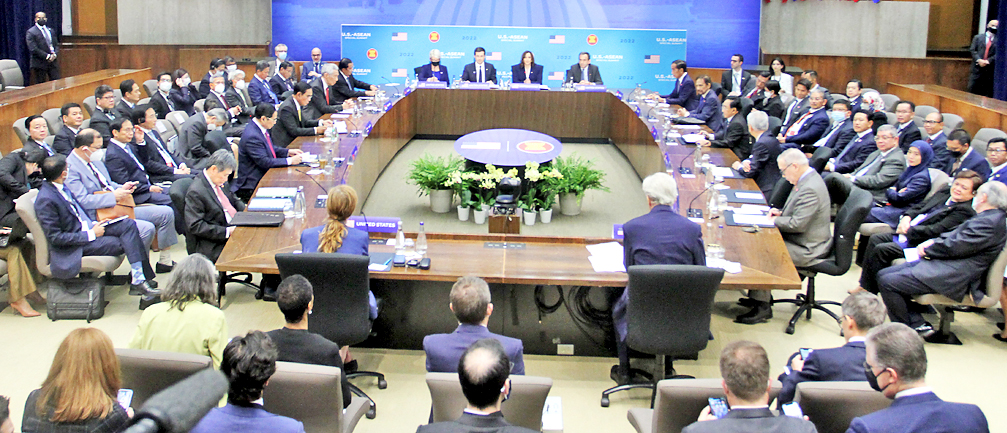
His Majesty concluded the titah by urging ASEAN and the US to remain committed to peaceful engagement through dialogues and consultations within the various ASEAN-led mechanisms to ensure continued regional peace, stability and prosperity.
The working luncheon began with welcoming remarks from the US vice president, during which she highlighted that the US remains committed to deepening its relationship with ASEAN and its member states, while noting the vital strategic importance of the region towards prosperity and security of Americans.
Leaders also discussed maritime cooperation as well as health and pandemic recovery.
His Majesty and other ASEAN leaders proceeded to the Loy International Conference Room to attend the ASEAN-US Special Summit.
Plenary Session One on Climate was chaired by Vice President Harris, attended by the US Special Presidential Envoy for Climate; US Secretary of Energy; US Secretary of Transportation; ASEAN heads of states and governments; and the ASEAN Secretary-General.
During Plenary Session One, His Majesty in a titah expressed appreciation to the US for its renewed commitment to climate change, as seen at the COP26 in Scotland and congratulated US President Joe Biden’s personal efforts to work with other major powers to implement the Paris Agreement.
As ASEAN is also placing greater emphasis on addressing climate change, such as the establishment of an ASEAN Climate Change Centre, His Majesty also thanked the US for its readiness to provide a science fellow to support the creation of the Centre in Brunei.
Looking ahead, His Majesty believed that there is more to be done in advancing commitments in climate action, especially through capacity building.
His Majesty affirmed that Brunei is prioritising efforts to ensure its economy remains resilient and sustainable through the utilisation of low carbon technologies, as well as promoting initiatives aimed at lowering net carbon emissions.
His Majesty also welcomed the US’ engagement in climate change initiatives in the region.
Plenary Session One also featured remarks from Vice President Harris during which she noted the impacts of the climate crisis on ASEAN and the US, and thus called for both sides to raise the collective ambition and meet infrastructural needs in a sustainable manner.
To this end, the US has launched initiatives on clean energy and climate smart infrastructure; partnerships on sustainable transportation and forest conservation; and satellite data sharing to respond to extreme weather.

